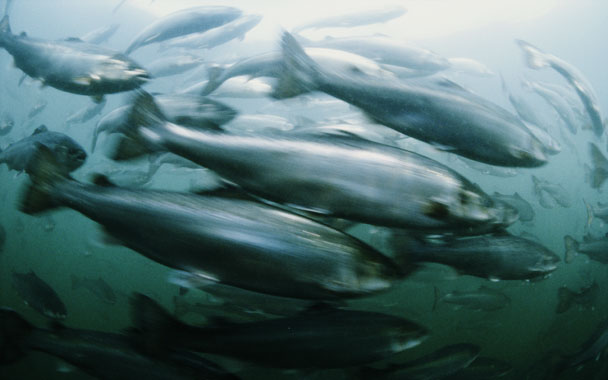Otto von Bismarck famously wisecracked, “Laws are like sausage. It is better not to see them being made.” After listening to aquaculture advocates and representatives of environmental groups squabbling at afternoon-long workshops on the subject the weekend before last, I’m convinced the same holds true—only more so—for setting organic standards applicable to farmed seafood.
It’s a question that will be much in the news in coming months. The United States Department of Agriculture (USDA), which establishes and enforces such standards, will unveil proposed rules this spring, and one thing is already certain: They will be contentious.
First let’s clear up some confusion. Currently there is no such thing as USDA-certified organic seafood. You’ve probably encountered fish labeled as “organic” at supermarkets and restaurants. That merchandise is certified by either a foreign country or an independent agency, whose standards fall far below what American consumers expect when they see the word organic. Wisely, California has banned such misleading labeling, but the federal government dodged the issue through a leap of logic that only a bureaucrat could appreciate: It says it can’t prohibit producers from calling their farmed fish organic because it has no organic policy in place for them not to comply with.
Hence the urgent need for the USDA to produce its own standards, a chore it has been wrestling with since 2001. There doesn’t seem to be any problem establishing criteria for fish raised on vegetarian diets in self-contained ponds, such as catfish and tilapia. The standards would be pretty much the same as those for chickens or hogs: no antibiotics and drugs; only organic feed.
But matters get very sticky when it comes to carnivorous predatory species like salmon, which need fishmeal and fish oil in their diets. Those products come from wild stocks, and as defined by the USDA, wild fish cannot be labeled organic (because it’s impossible to control their diets and ensure that they come from clean waters). There are other, similar Catch-22 situations. For instance, salmon net pens in the open water are sprayed with pesticides to reduce sea lice, which don’t harm mature farmed salmon, but are fatal to juvenile wild salmon. Eliminate the pesticide, as you would under normal organic requirements in order not to harm the environment, and you actually harm the environment more by killing threatened wild salmon. And so on …
But there’s big money to be made in salmon farming—all the more if your fish sell for the premiums that official organic certification confers. So the people in charge of drawing up organic aquaculture standards seem hell-bent on drafting regulations that conform to the current state of salmon farming, rather than insisting that salmon farmers conform to what most consumers would consider reasonable organic requirements.
It was only at the very end of the workshop that Christopher Mann of the Pew Environmental Trust made a simple, sensible suggestion that would put an end to all these circular arguments: “It sounds to me like we are trying to pound a square peg into a round hole. Maybe we have to face the fact that for some types of aquaculture, the answer is simply no”—that is, when it comes to certain species, organic standards just won’t work.


